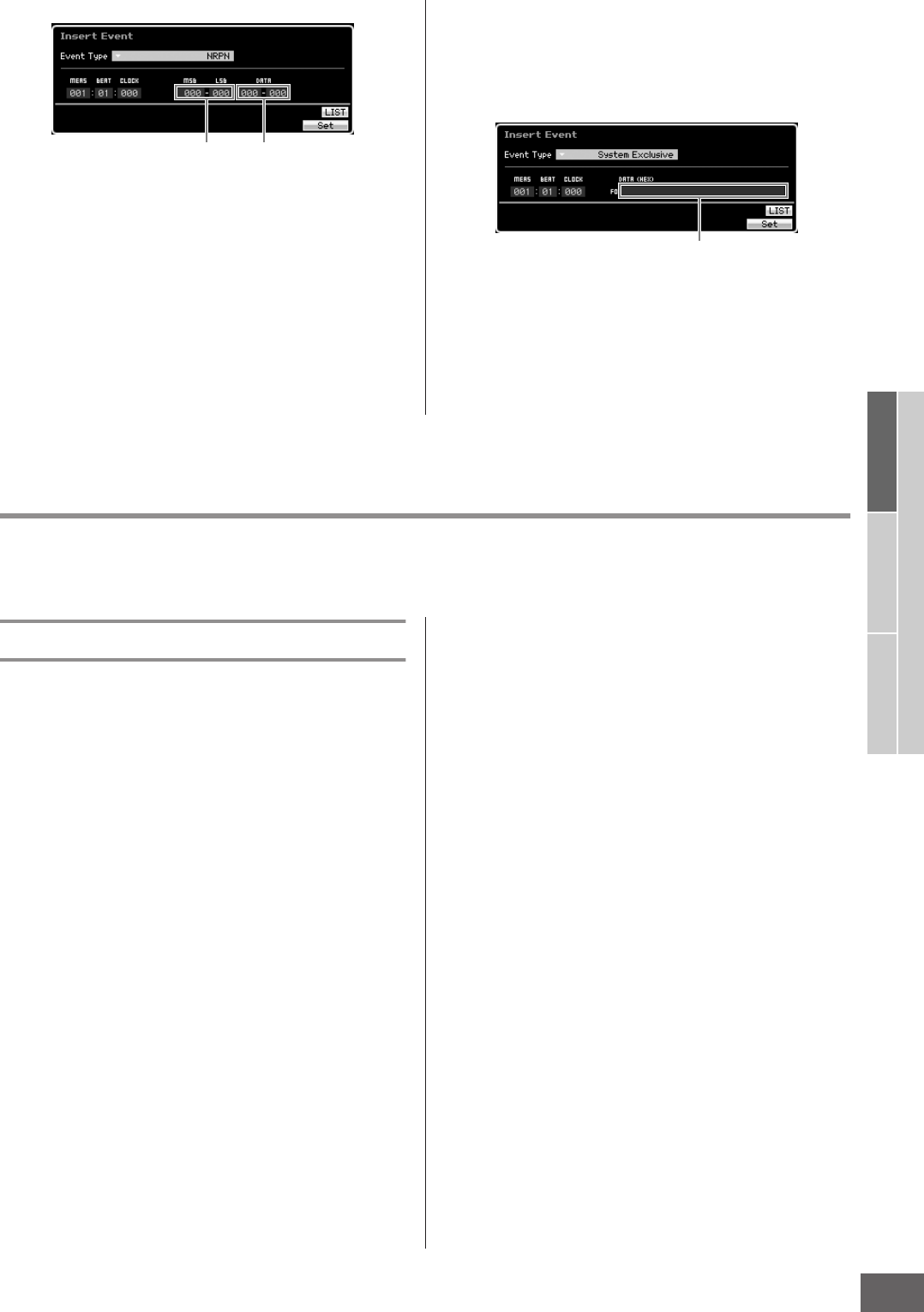
MOTIF XS Owner’s Manual
Basic Structure
79
Basic StructureBasic Operation
Connections
Basic Section
Non-Registered Parameter Number (NRPN)
Changes parameter values for each tone generator Part.
There is no compatibility between different manufacturers.
Numerous parameters specific to each tone generator can be
controlled to produce tonal changes. Normally three types of
control change data are sent: NRPN MSB (99), NRPN LSB
(98), and Data Entry MSB (6). In the MOTIF XS, this group of
control change events is handled as one. Once an NRPN is
specified, the following data entry message received on the
same channel is processed as the value of that NRPN. Prevent
operational errors by transmitting an RPN Null message (7FH,
7FH) after using these messages to perform a control
operation. For filter cutoff frequency, resonance, and other
independent control change parameters, it is normal to use
the independent control change parameters rather than the
NRPN.
n This MIDI event cannot be handled by the tone generator
block, although it can be recorded to a Song/Pattern track.
System Exclusive
Changes internal tone generator settings such as Voice and
effect settings, remote switch control, tone generator mode
switching, and others via MIDI. The 2nd byte is a manufacturer
ID number, and there is no data compatibility between
manufacturers. This type of event is used to control MOTIF XS-
specific functions. The cursor can be used to scroll through
the data if the data size is greater than 17 bytes.
Internal Memory
As you use the MOTIF XS, you will create many different kinds of data, including Voices, Performances, Songs, and Patterns.
This section describes how to maintain the various types of data and use the memory devices/media for storing them.
Internal Memory
Below are explanations of the basic terms related to
memory.
Flash ROM
ROM (Read Only Memory) is memory designed
specifically for reading out of data, and as such data
cannot be written to it. Unlike conventional ROM, Flash
ROM can be overwritten—allowing you to store your own
original data. The contents of Flash ROM are maintained
even when the power is turned off.
DRAM
RAM (Random Access Memory) is memory designed
specifically for data writing and data reading operations.
There are two different kinds of RAM, depending on the
condition for storing the data: SRAM (Static RAM) and
DRAM (Dynamic RAM). The MOTIF XS is equipped with
only DRAM. The created data stored on DRAM is lost when
the power is turned off. Because of this, you should always
store any data residing in DRAM to the USB storage device
or the computer connected to the network before turning
off the power.
n Among data residing in DRAM, only Waveform data can be
saved to the external USB storage device or a computer
mounted by the MOTIF XS.
DIMM
DIMM modules must be installed in order to use the
Sampling function or to load audio data (Waveform/WAV
file/AIFF file) to the instrument. As with DRAM described
above, the created data stored on DIMM is lost when the
power is turned off. Because of this, you should always
store any data residing in DIMM to the USB storage device
or the computer connected to the network before turning
off the power.
Edit Buffer and User Memory
The edit buffer is the memory location for edited data of
these types: Voice, Performance, Master, Song Mixing, and
Pattern Mixing. Data edited in this location will be stored to
the User Memory.
If you select another Voice, Performance, Master, Song, or
Pattern, the entire contents of the edit buffer will be
rewritten with the newly selected Voice/Performance/
Master/Song Mixing/Pattern Mixing data. Make sure to
store any important data before selecting another Voice,
etc.
Edit Buffer and Recall Buffer
If you’ve selected another Voice/Performance/Song/Pattern
without storing the one you were editing, you can recall
your original edits, since the edit buffer’s contents are
stored in backup memory.
n Keep in mind that the recall buffer is not available in the
Master Edit mode.
NRPN number
MSB-LSB
Data entry
MSB-LSB
Data


















